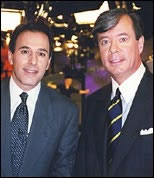The Today Show - Interview with Matt Lauer
Plastic Surgery New York
The Today Show
Topic: How to Pick a Plastic Surgeon


KATIE COURIC: Next up, what you should know before choosing a plastic surgeon. But first...this is TODAY on NBC.
MATT LAUER: This morning on our continuing series, FOREVER YOUNG: A GUIDE TO LIFE AFTER 50, how to pick a plastic surgeon. In 1996, almost a million cosmetic surgery procedures were performed. That's an increase of more than 50% over the past five years. Dr. Darrick Antell, a board-certified plastic surgeon in New York City, has a rundown of things you should know before having plastic surgery.
Dr. Antell, good morning. Welcome back.
DR. DARRICK ANTELL (Plastic Surgeon): Good morning. Thank you.
MATT LAUER: This is-this is nip and tuck to some people. But let's remember, this is surgery. So, the decision's important.
DR. ANTELL: Absolutely. You can't forget that it's surgery, and there are potential complications. That's why it's critical that you invest time to pick a surgeon properly. Some people spend more time picking a toaster oven than they do their surgeon.
MATT LAUER: So what do you do to get information about the different doctors who are available in your area?
DR. ANTELL: Well, I get asked that question a lot because New York City is a mecca for this type of surgery. And I recommend that people start developing a list of potential candidates. See if the same names keep coming up more than once. Ask your personal physician, ask you friends. I would ask hospital personnel. And most importantly, I would check if the doctor has privileges to do the operation you're interested in in a hospital environment.
MATT LAUER: That means the doctor has been through some kind of peer review at that hospital.
DR. ANTELL: Yes.
MATT LAUER: So-so you're getting a fairly qualified or very qualified doctor?
DR. ANTELL: Absolutely. Because today, many of these operations are done outside the hospital. And there's less peer review. So, if the doctor has privileges to do it in a hospital environment, you can feel comfortable that he's undergone that peer review.
MATT LAUER: Two words we hear an awful lot about when talking about plastic surgery, board-certified. How important?
DR. ANTELL: Board certification is very important. But it's become kind of a buzz word. Consumers know it, but they don't really understand all the different boards. It's very confusing. What you want to look for is board certification in plastic surgery, and "in" is the key word.
MATT LAUER: So, in other words, you're saying a doctor could be board-certified but not in the area you need him or her to be.
DR. ANTELL: Exactly. And today, unfortunately, in this era of commercialization of medicine, many people advertise. And they'll put board-certified in the ad, but not indicate what specialty they're board certified in. So you want to check what specialty they're board-certified in. (http://www.CERTIFIEDDOCTOR.ORG)
MATT LAUER: And an easy way to find out about board certification, we have a phone number we want to put up right now. (1-800-776-2378)
DR. ANTELL: Yes. It's the American Board of Medical Specialties. And they are the only board recognized by the American Medical Association to certify people in over 24 medical specialties, one of which is plastic surgery.
MATT LAUER: What about when someone is having a procedure done, say a nose surgery, but it's for more than a cosmetic reason - it's because they have polyps or breathing problems or sinus problems. Do you look for different kind of doctor?
DR. ANTELL: Well, you may. An ear-nose-throat doctor would be board-certified in otolaryngology. And that's what the board certification would come up as. What we do in my practice is, if there's a problem with the breathing, I may work in conjunction with the ENT doctor, where I'll do the cosmetic part for the external portion.
MATT LAUER: Right.
DR. ANTELL: ...and the same operation, they can correct the internal parts.
MATT LAUER: So, would you give someone a referral, then, for the other doctor as well?
DR. ANTELL: Yes. Absolutely. And we have a phone number, by the way, for that also.
If you're looking for a referral on a surgeon, this is a different number than before 1 (800) 635-0635. Now, once you've narrowed down the number of doctors in your area....
DR. ANTELL: Uh-huh.
MATT LAUER: You should go for a consultation. Very important. But what do you do at that consultation?
DR. ANTELL: Well, during the consultation, I would start by looking at the office, make sure it's clean, friendly. Make sure you have some rapport with the surgeon. I would ask about potential risks. I would ask if he does the surgery himself. Very important question.
MATT LAUER: Also it's important to note how much time the doctor's willing to spend with you during the consultation. You don't want someone who's going to run in, look and go, and run out.
DR. ANTELL: I would ask about costs. I think cost needs to be gone over in great detail. And this is an area where it pays to pay retail.
MATT LAUER: You see on billboards and you see on television doctors who advertise that they use this computer system to show the patient what she or he might look like after surgery. You, though, tell a patient to stand in front of a mirror, and you actually use you hands. Why?
DR. ANTELL: I do that for a couple of reasons. I believe it's more accurate. I think the computer is misleading. It doesn't account for swelling. But I need to feel their skin. And by feeling the texture of their skin, if I'm going to be doing a face-lift, it may modify the techniques that I'll use to get the best possible result.
MATT LAUER: So is this computer imaging a gimmick?
DR. ANTELL: I believe that it's a gimmick. I think there's no way you can guarantee that result.
MATT LAUER: Quickly, what's the most typical side effect from plastic surgery that people should know about?
DR. ANTELL: I would say a hematoma is one of the most common. It's a collection of blood, and in most cases, it's small and goes away on its own.
MATT LAUER: Dr. Darrick Antell, great information.
DR. ANTELL: Thank you.


